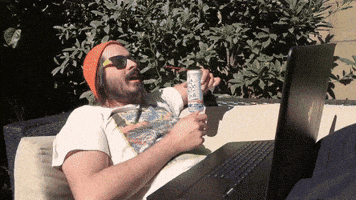The Forgotten Users: How African Innovators Are Rethinking Disability Access
...when inclusion leads innovation, no one’s 🙅 left behind! 🙌
Hi-ya, Dear Innovator 👋
It’s another Saturday, and you deserve a much-needed break—what with all the world-saving you’ve been doing all week!! 😄
And since nothing says snuggle buddy better than a newsletter from us, you’re gonna wanna grab a blanket, your favourite snack too, and jussssst…
Comfy? 😉 Good!
Let’s get to the good stuff 👇
Did you know…?
An estimated 60–80 million Africans live with disabilities, yet only 15–25% of those who need assistive devices can get them. It’s also true, according to the World Health Organisation (WHO), that about 15% of the world’s blind are in Africa, but few African schools have enough Braille books or readers.
In Kenya, over a quarter-million people have significant hearing impairments—and the problem is often exacerbated by the lack of affordable interpreters, which leaves many isolated. The rough terrain and poor infrastructure also limit the use of mobility aids—and this is just one country! 😢
To fill these gaps, some African solution providers are leveraging smartphones, AI, and local manufacturing to deliver context-appropriate solutions.
1) Visis (AI reading for the blind)
Founded in 2020, Vinsighte is a Nigerian EdTech that designs and develops artificial intelligence (AI) assistive reading solutions for people with visual impairments, ADHD, and dyslexia
Vinsighte’s Visis app equips smartphones to serve as “smart reading glasses” for blind users. Using OCR and computer vision, it scans printed text, signage and objects and reads them aloud 😍 Vinsighte has partnered with MIT, Mastercard Foundation, Facebook, Atos, and Halcyon to develop and improve its core technology. The company distributes the app through schools and community partners and has reached around 5,000 visually impaired users to date.
By converting textbooks and handouts into audio, Visis is tackling the current chronic shortage of accessible learning materials and while boosting the literacy and confidence of blind youths.
2) Kenyan Sign-Language Solutions
Kenya has seen two complementary breakthroughs in communication for the deaf.
a) First, the ‘assistALL’ app by Signs Media links deaf users on demand with human sign-language interpreters via video call.
This service can be accessed for a small fee (about $0.30 per call) and is expected to benefit Kenya’s roughly 260,000 people with hearing loss. It helps in settings like hospitals, banks or courts where deaf individuals previously needed third-party interpreters.
b) Second, inventor and innovator, Roy Allela developed ‘Sign-IO’. It’s a pair of sensor-laden gloves and it can be used to translate Kenyan sign language into spoken words via a Bluetooth-connected mobile app.
How it works, a user wears the red glove, signs words, and the system vocalizes them in real time. The gloves have shown ~93% accuracy and are already being tried in rural special-needs schools! 💪
Others include:
SafariSeat: This is a Kenyan-built wheelchair designed for rural conditions. Co-founder, Ken Mwarandu, partnered with int’l designers to produce a rugged chair made from bicycle wheels and simple springs.
The open-source design lets any workshop to build and repair them using local parts. Unlike donated chairs that break on dirt roads, SafariSeat’s suspension and lever-driven wheels seem to have been built to handle sand and rocks.
Kyaro: In Tanzania, Kyaro Assistive Tech is tackling wheelchair access with affordability. Cofounded in 2019 by Eamon O’Brien, Kyaro produces an “active wheelchair” (≈ $200), that’s made from steel tubing and bicycle tires 🤯
It is tailored for outdoor use and fully repairable in-country. They’ve also built rolling gait trainers for those who are not yet able to walk independently and all the devices use locally sourced materials that are designed to be desirable, not stigmatizing.
These innovations demonstrate what’s possible when African innovators co-create with users. But there’s still much work to be done.
At the risk of minimising the great lengths these innovators have gone to in making life a little more normal for the physically challenged, the real question is: What if things could be even more normal? 🤔
What if they didn’t need “special” solutions just to carry on in society? What if more innovators—like you 🫵—built solutions with features and add-ons that make life easier for blind or deaf individuals?
What if every day didn’t have to be a rude reminder of the difficult hand life dealt them? What if more innovations tapped into the potential of these often-overlooked groups, and blurred the lines between the able-bodied and the disabled?
What if…?
The New Way: Inclusive Innovation
In today's digital world, access to mainstream applications like WhatsApp, banking apps, and even digital payments can be a challenge for people with disabilities.
That's where a few African innovators are stepping in, not by creating niche apps for people with disabilities, but by building solutions that make regular apps and tech solutions accessible to everyone.
In South Africa, there’s SignSupport. Developed by the University of the Western Cape, this mobile app provides pre-recorded South African Sign Language (SASL) videos to assist deaf users in various scenarios, such as pharmacy visits and diabetes self-management. It has been adapted for use with WhatsApp and includes features like video relay services for real-time interpretation.
In Kenya, innovators are embedding voice assistants and screen readers into mobile banking apps, ensuring that blind or partially sighted users can access financial services just as easily as anyone else. A good example of this is Safaricom's use of Interactive Voice Response (IVR) technology to assist visually impaired users with mobile money services.
The Take-home..?
These innovative solutions show how integrating accessibility into everyday apps can create a more inclusive digital society. The efforts to embed tools like voice commands, real-time transcription, and AI-powered assistants into mainstream apps are not just helping people with disabilities—they're revolutionizing how we view accessibility.
African innovators can pave the way for a world where technology and innovative solutions aren’t things to overcome but rather, can be adapted to everyone’s needs.
Will you be taking on this new challenge? 🤨




